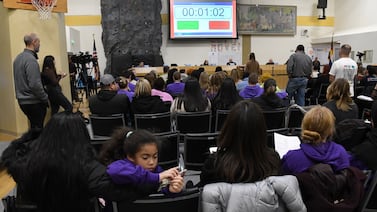The Tennessee Supreme Court will rehear arguments in the case of educational savings accounts, also known as vouchers. The court’s announcement on Tuesday comes in the wake of the death of Justice Cornelia Clark who was on the bench in June to hear the arguments, but died of cancer in September before the court was able to issue a ruling.
In the brief order, court members said that “in light of the untimely death of Clark, this court has concluded that re-argument will aid the resolution of this appeal.”
Clark, appointed by former Democratic Gov. Phil Bredesen, had served with the Court for 16 years and heard more than 1,100 cases, making her one of the longest-serving justices among her colleagues. In her stead, Tennessee Court of Appeals Judge Thomas “Skip” Frierson will hear the case. Republican Gov. Bill Haslam appointed Frierson to his seat in 2013.
At stake in the case is the future of school vouchers in Tennessee. Republican Gov. Bill Lee pushed the educational savings accounts, or school voucher law, in 2019, as a way for students in Nashville and Memphis to use public funds to pay for private education, supplies, and tutoring. The program was to begin with 5,000 students and grow to 15,000 by the fifth year, but the program never got off the ground as multiple courts blocked it.
In 2020, the Tennessee Court of Appeals unanimously upheld the ruling of a lower court that the law was unconstitutional, siding with the main plaintiffs, Metro Nashville Public Schools and Memphis’ Shelby County Schools.
In an earlier ruling from a lower court, Davidson County Chancellor Anne Martin wrote, “There is no dispute that the qualifications were tailored, through multiple amendments, to only include those two school systems, and that bill sponsors could only secure passage from representatives against the bill if their district school systems were excluded.”
It is one of many high-profile cases in state and federal courts right now that center on education. A six-year-old school funding case remains tangled in the courts, but parties in that case recently requested a delay until the end of the upcoming legislative session. The governor has announced that an overhaul of school funding may be on the legislative agenda, and the state has hosted several recent public forums to discuss the issue.
Also still winding through the courts are multiple school mask cases. Parents across the state have filed federal lawsuits against the Lee Administration over his policies that ban universal masking in public schools. The suits argue that the policy puts their immunocompromised children at greater risk for contracting COVID and facing the elevated health risks the virus inflicts on immunocompromised people.
The state Supreme Court will hear the school voucher case in Nashville on February 24.






